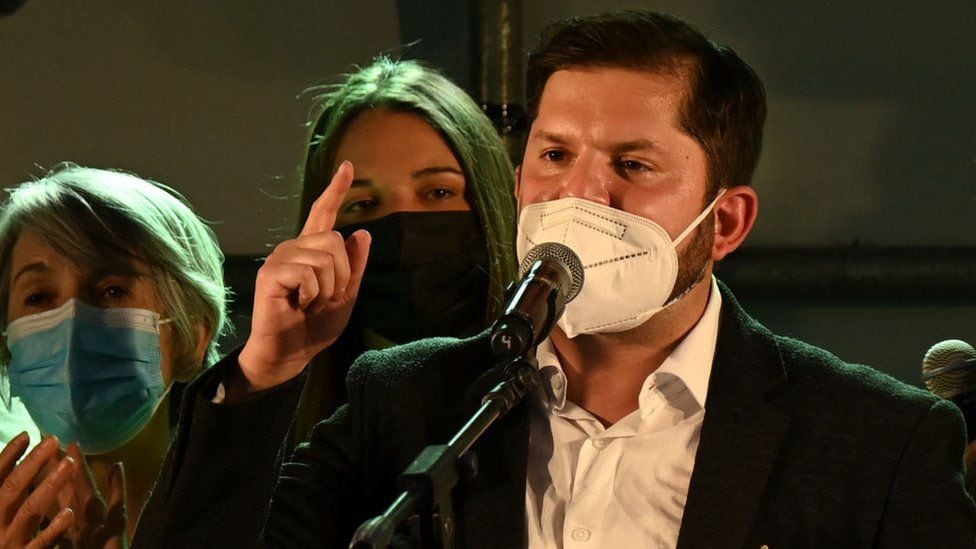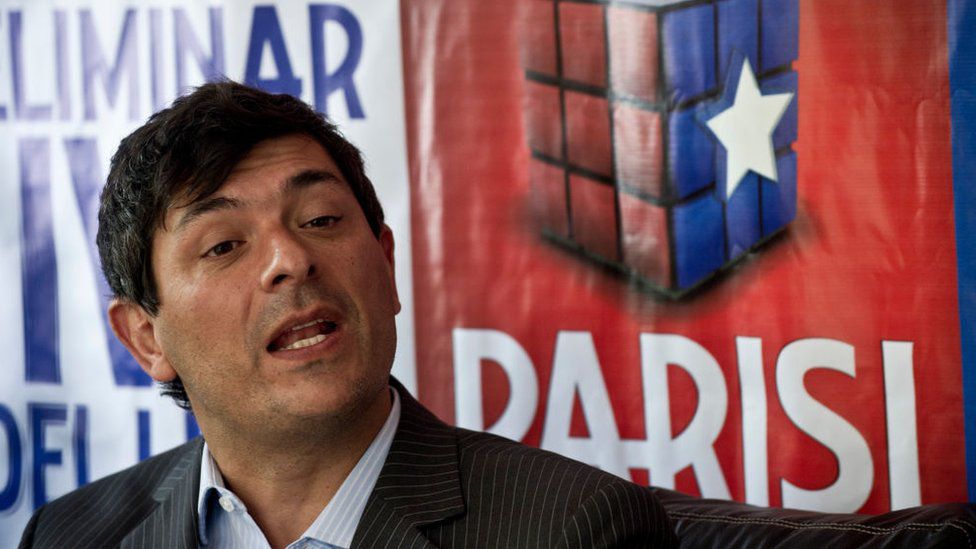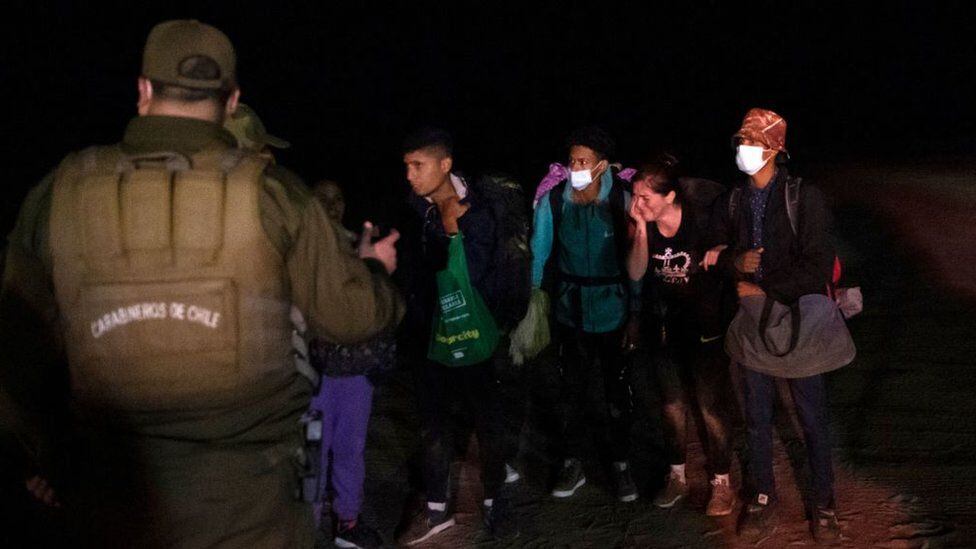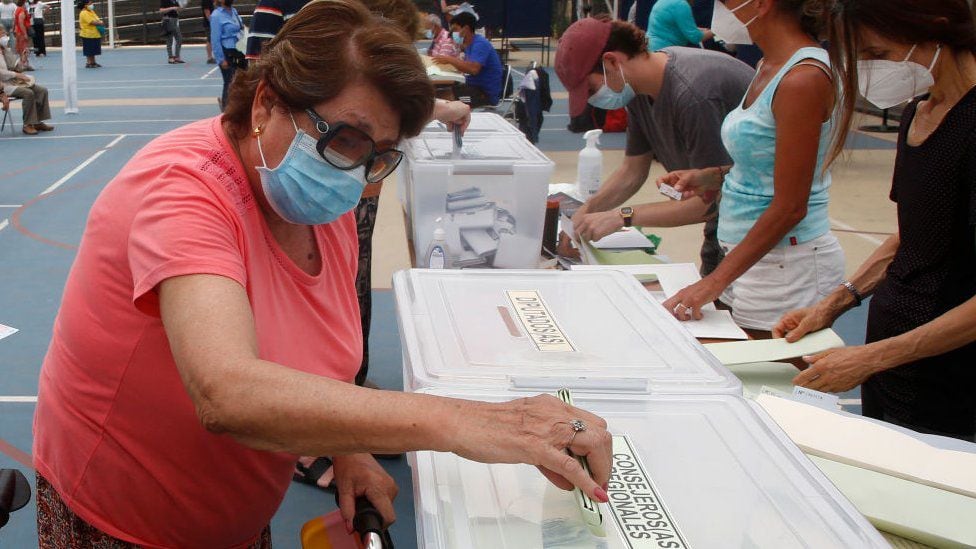The first round of presidential elections in Chile not only left a ballot between the radically opposite positions of the rightist Jose Antonio Kast and the leftist Gabriel Boric.
The hectic electoral day also left several surprises that reveal the political change that this South American country is experiencing.
WATCH: LIVE | Chile elections 2021: far-right Kast and leftist Boric go to the second round | PHOTOS
And it is that for the first time since the return to democracy, in 1990, the presidency will not be disputed by the traditional center-left and center-right parties.
- The uncertainty with which Chile reaches the first elections in 16 years without Piñera and Bachelet (and what are the possible scenarios)
- Why the “mega-elections” in Venezuela are different (and how the opposition returning to the polls has changed)
- “We could see 500,000 more deaths by March 1”: WHO’s concern about the increase in coronavirus cases in Europe
The triumph of Kast, radical right, seems to interrupt the shift to the left that has been taking place in Chile since the social outbreak of October 2019, when the massive protests began demanding profound reforms to the current Chilean economic, political and social system.
Furthermore, the appearance of a completely “outsider” candidate such as Franco Parisi it further muddies the second round of elections, which will take place on December 19.
These and other surprises that we present here reflect the profound transformation of the Chilean political map.
1. The fall of the traditional parties
As already seen in the election of the Constituent Convention in May, in which the independents triumphed, the first presidential round confirmed the fall of the great traditional parties that since the return to democracy in 1990 they had alternated in power.
Neither of the two traditional conglomerates (the center-right and the center-left) will be in competition for the presidency on December 19. The parties that have governed Chile for 30 years came in fourth and fifth in the presidential race.
Sebastián Sichel, who represented the right-wing ruling party, was fourth, while Yasna Provoste, from the center-left, was fifth.
However, both achieved important results this Sunday in Congress, a paradox “that raises the question about the system of government that will prefer the constitutional convention,” political scientist Javier Sajuria told BBC Mundo.
In a country undergoing social transformation, voters mostly opted for positions more to the left (Boric) and to the right (Kast) than the traditional ones, a sample of a patent polarization in many countries of the world, in the region and also now in Chile.

Boric, a critic of the center-left governments that assumed command of the country after the return of democracy, capitalized on the social discontent that demands a greater presence of the State and more inclusive policies with more transformative proposals than those of Provoste from the center-left.
For its part, Kast has followed the lead of Donald Trump in the United States or Jair Bolsonaro in Brazil to take the right more to the extreme compared to the traditional one represented in recent years by the current president Sebastián Piñera.
For Cristóbal Bellolio, doctor in Political Philosophy and professor at the Adolfo Ibáñez University, the victory of Kast, who openly sympathizes with the de facto government of Augusto Pinochet, sharpens “the contradictions in a very unusual way, because one would expect that after the social outbreak , which had left-wing demands, will be capitalized by the group that most identifies with those demands. “

“What nobody expected is that a more conservative, more reactive and nationalist right would be the one that would write down its name in the second round. Because many people expected that the post-Pinochet right would be more liberal, more centrist, more moderate.”
So it was with the Piñera governments, whose inheritance, taken by Sichel in these elections, was surpassed by the extreme.
2. The surprising “outsider” that can be key
The big surprise of the election night was Franco Parisi’s third place, a liberal economist who has campaigned from the United States, without stepping on the country and whom several analysts define as a populist.
But not only was he not in the campaign, but he has not returned to Chile for two years. There is a complaint against him for not paying child support, which would prevent him from leaving the country if he decided to enter. But Parisi denies that this is the reason.
That did not prevent it from being the third most voted force behind Kast and Boric, and ahead of Sichel and Provoste with 12.80% of the support.

Although it is difficult to do straight math, it is to be expected that the center-right will lean for Kast, while the center-left will lean for Boric. But what will the voters of Parisi do?
Although his social postulates do not coincide with Kast’s conservatives, there are parallels with economic policies. It is possible that you define your supports for the second round through a digital consultation.
12.80% is three points better than what Parisi achieved in the 2013 presidential elections.
Its success was based on a strong digital campaignl with content on own channels and social networks, and with a critical discourse with the political class that, as in many parts of the world, also resonates with success in Chile.
“He is a candidate who knew how to position himself very well in a populist, anti-political discourse and aimed at those who reject in the same way the parties of the center-left as of the right “, affirms the political scientist Javier Sajuria.
“That is, people who do not agree with the traditional parties or with the system in general,” adds the expert, in a climate in which the social outbreak turned the political status quo in Chile.
Kast and Boric are the example of this, but also the atypical Parisi, whose votes may be the key to the ballot.
3. North turns right
The north of the country, which was a traditional center-left bastion, confirmed in this election the turn to the right at a time of great migratory tension in the area.
In Arica and Parinacota, the northernmost region, the most voted ones were Kast and Parisi. The same in Tarapacá; and in Antofagasta Parisi won, followed by Kast.
“There were already signs of that turn in 2013. They are mining areas, where the state is non-existent and there is a floating population of high resources, due to the salaries of mining, but of manual labor. Individual effort prevails over state support, and that discourse works well with Parisi, “says Sajuria.

Both in Arica and Tarapacá the migration crisis It has been a key electoral issue given that it has been the sectors that have suffered the most from the rise in migrants who have entered through unauthorized steps, especially Venezuelans.
Kast even advocates the construction of a ditch and has made migration the strong point of his campaigns. He visited the town of Colchane, the epicenter of the migratory tension.
Parisi, for his part, proposes a reinforced border control between the Police and the Armed Forces and deport those who commit crimes.
In the northern regions of the country there are the richest copper deposits, of which Chile is the world’s largest producer, and where life is very expensive and there are income differences between mining workers and the rest of the population that successive governments of traditional parties have not been able to reduce.
“In the north there is greater disenchantment with the traditional political parties,” Rodrigo Espinoza, an analyst at the Diego Portales Espinoza University, told AFP news agency.
A key for Boric to be able to prevail over Kast is to convince the voters of Parisi in those northern regions to try to regain the advantage with which the right-wing party faces the first round.
4. The right is tied in the Senate (and the surprise return of the PC)
Whoever the next president of Chile is, the political makeup of Parliament will be of vital importance.
Despite the poor performance of the candidates Sichel and Provoste – who obtained fourth and fifth places in the presidential race, respectively – both the center-right and the center-left managed to maintain their hegemony in the Upper House.
But it was especially surprising the triumph of the right wing, which managed to reach the 25 senators, equivalent to half the Senate (50%), an unprecedented scenario since 1990.

To the official pact “Chile Podemos Más”, it was added Edwards Red, a candidate from the Republican party, José Antonio Kast.
This data is relevant, considering that if the left managed to reach La Moneda, it would find here an important counterweight in its proposals,
Currently, the center-right conglomerate has 19 senators, equivalent to the 44%. According to the newspaper La Tercera, the sector hoped to maintain its relative weight (and, at best, increase its presence to 46% in the best of cases), but the results were much more auspicious.
For its part, the center-left managed to remain the second force in the Senate, with a total of 18 senators.
However, another surprise was the performance of the Communist Party who managed to return to the Senate (with Claudia Pascual and Daniel Núñez), where they had not had a representative since 1973.
In the Chamber of Deputies, meanwhile, the communists also achieved a favorable advantage by winning 11 seats, confirming their influence in the conglomerate Approve Dignity, which supports Gabriel Boric.
In any case, it is important to note that neither the eventual government nor its opposition will have a majority in the Lower House.
______________________________
- Journalist who reported on the start of the coronavirus in Wuhan is on the verge of death in jail, according to his family
- Mortuary clerk admits he committed dozens of sexual assaults on corpses
- Austria offers jobs with salaries of up to US $ 4,000 to foreigners, including Peruvians: what profession are they looking for and how to apply?
- Salt Bae Feeds Vietnam’s Communist Minister With More Than $ 1,100 Gold-Plated Steak | VIDEO
- Life sentence for woman who murdered five of her children in revenge because her husband left her
- Bill Gates talks about an upcoming threat that would put the world ‘in check’
.

:quality(75)/cloudfront-us-east-1.images.arcpublishing.com/elcomercio/GE4DCMRNGEYS2MRSKQYDAORRHA.jpg)





